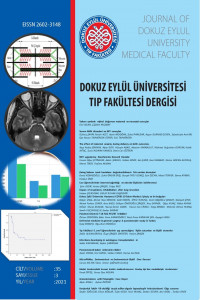Impact of respiratory rehabilitation on anxiety and depression in post-operative lung cancer patients
Öz
ABSTRACT
Introduction: Whether respiratory rehabilitation is beneficial for patients, who have undergone lung resection due to cancer, is still under debate. We investigated the impact of respiratory rehabilitation on the quality of life, and anxiety and depression levels of patients.
Method: Patients, to whom respiratory rehabilitation was recommended after lung resection, were assessed with the 6-minute Walk Test (6MWT), Visual Analog Pain Scale (VAS), Quality of Life Questionnaire (EORTC QLQ C30) and Hospital Anxiety and Depression Scale (HADS) on date of first admission and date of discharge. These questionnaires were repeated 6 months after respiratory rehabilitation ended.
Results: 186 patients applying to the physiotherapy unit after lung resection were included in the study. 78 (42%) of these patients received respiratory rehabilitation services and the assessment questionnaires were repeated with these patients 6 months after discharge. During respiratory rehabilitation the average quality of life score increased from 55.4 to 67.9 (p<0.05), the average anxiety score dropped from 5 to 3 and the average depression score from 3.5 to 2.5 (p<0.05). 6 months after discharge, the average quality of life score remained stable at 66.9 (p=0.8), the average anxiety score increased to 5.5 (p<0.05) and the average depression score to 5 (p<0.05).
Conclusion: This observational study carried out during respiratory rehabilitation has shown that after treatment there is an improvement in the quality of life, and anxiety and depression levels of patients. It was observed that after discharge, the quality of life score of patients remained stable, whereas anxiety and depression levels deteriorated.
Keywords: Lung cancer, pulmonary resection, respiratory rehabilitation, quality of life
Anahtar Kelimeler
Lung cancer pulmonary resection respiratory rehabilitation quality of life
Kaynakça
- Miyoshi S, Yoshimasu T, Hirai T, et al. Exercise capacity of thoracotomy patients in the early postoperative period. Chest 2000; 118:384-90.
- 2. Cavalheri V, Tahirah F, Nonoyama M, Jenkins S, Hill K. Exercise training for people following lung resection for non-small cell lung cancer – a Cochrane systematic review. Cancer Treat Rev 2014; 40: 585–594.
Impact of respiratory rehabilitation on anxiety and depression in post-operative lung cancer patients
Öz
ABSTRACT
Introduction: Whether respiratory rehabilitation is beneficial for patients, who have undergone lung resection due to cancer, is still under debate. We investigated the impact of respiratory rehabilitation on the quality of life, and anxiety and depression levels of patients.
Method: Patients, to whom respiratory rehabilitation was recommended after lung resection, were assessed with the 6-minute Walk Test (6MWT), Visual Analog Pain Scale (VAS), Quality of Life Questionnaire (EORTC QLQ C30) and Hospital Anxiety and Depression Scale (HADS) on date of first admission and date of discharge. These questionnaires were repeated 6 months after respiratory rehabilitation ended.
Results: 186 patients applying to the physiotherapy unit after lung resection were included in the study. 78 (42%) of these patients received respiratory rehabilitation services and the assessment questionnaires were repeated with these patients 6 months after discharge. During respiratory rehabilitation the average quality of life score increased from 55.4 to 67.9 (p<0.05), the average anxiety score dropped from 5 to 3 and the average depression score from 3.5 to 2.5 (p<0.05). 6 months after discharge, the average quality of life score remained stable at 66.9 (p=0.8), the average anxiety score increased to 5.5 (p<0.05) and the average depression score to 5 (p<0.05).
Conclusion: This observational study carried out during respiratory rehabilitation has shown that after treatment there is an improvement in the quality of life, and anxiety and depression levels of patients. It was observed that after discharge, the quality of life score of patients remained stable, whereas anxiety and depression levels deteriorated.
Keywords: Lung cancer, pulmonary resection, respiratory rehabilitation, quality of life
Anahtar Kelimeler
Lung cancer pulmonary resection respiratory rehabilitation quality of life
Kaynakça
- Miyoshi S, Yoshimasu T, Hirai T, et al. Exercise capacity of thoracotomy patients in the early postoperative period. Chest 2000; 118:384-90.
- 2. Cavalheri V, Tahirah F, Nonoyama M, Jenkins S, Hill K. Exercise training for people following lung resection for non-small cell lung cancer – a Cochrane systematic review. Cancer Treat Rev 2014; 40: 585–594.
Ayrıntılar
| Birincil Dil | İngilizce |
|---|---|
| Konular | Onkoloji ve Karsinogenez |
| Bölüm | Araştırma Makaleleri |
| Yazarlar | |
| Yayımlanma Tarihi | 30 Aralık 2021 |
| Gönderilme Tarihi | 3 Nisan 2021 |
| Yayımlandığı Sayı | Yıl 2021 Cilt: 35 Sayı: 3 |


